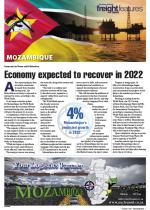Ongoing interest in the movement of bulk cargo through the Port of Maputo is good news for the Mozambican logistics sector.According to Mark Krueger, business manager for LBH Mozambique, pandemic-related change and unpredictability has forced companies to find new ways to support bulk exporters.“We see growing interest in moving bulk material through Maputo, and in developing corridors to move exports and imports from inland countries to ports such as Beira and Nacala,” he told Freight News. “As a company our focus has been on creating innovative solutions for clients. In Africa, just as important as solutions, is having the right people on hand to make those solutions a long-lasting reality.”He said the company was at present reinvigorating its consumables delivery services to meet the changing needs of Mozambique’s economy and the global supply chain.“We are also maintaining our focus on projects, delivering tailor-made logistics solutions that are cost-effective and efficient. The upcoming expansion in Temane, along with growth in infrastructure and communications in Mozambique, as well as the growth of mining in the country are exciting developments in the project sector.”Asked about challenges, Krueger said the interconnectivity with global supply chains was still problematic.“A lot of this relates to the global supply chain disruptions from the Covid-19 pandemic. This includes bottlenecks and capacity restrictions at ports, reliable access to the right shipping vessels, and even availability of shipping containers.”Logistics companies, he said, needed to actively help clients manage all these challenges and bottlenecks, and look at workable alternatives. “We can see that many service providers are embracing new technologies, world best practices and training to deliver a new standard of quality, safety and performance.”In this regard, LBH Mozambique was continuing to gear up, said Krueger, to meet the standards and global expectations of the many international industrial clients from the oil and gas as well as mining and communication sectors.According to Krueger, new opportunities were continuing to open up in the country as corridors were developing.“Despite the delays on the Afungi-based developments for LNG, we have continued to see confidence in developing hydrocarbon resources in Area 4 under the Eni-operated Coral South project, and also the expansion of the Temane field and gas plant construction under Sasol. The change in the global geopolitical landscape and supply chains has also resulted in a recent surge in interest in Mozambican coal,” he told Freight News.Mozambique is rich in resources and minerals that are required to support the 5th industrial revolution, including lithium, cobalt, solar and wind energy.“This continues to attract investment and interest in Mozambique, and often in remote or challenging locations that require an innovative and adaptable logistics par tner.”Another development, said Krueger, was the increased competitiveness in rates for local services, something to which everyone needed to pay attention. “What we feel will distinguish those who are successful long-term, though, will be the delivery of innovation and quality of service. That includes efficiency through the use of technology, partnering with those best positioned to manage risk, and continuing to strive for operational excellence in all that is delivered.”He said the soon-to-open ring road, linking the N4 at outer Matola with Marracuene, was a positive development and would allow an efficient and safe bypass for freight coming in from South Africa, but heading onto regional destinations.“This will reduce congestion on the existing routes through the city and port areas, as well as improve speed and safety for freight travelling north in Mozambique. We are also excited about the ongoing port expansion and development projects at Nacala and Beira. These are integral to executing the vision of leveraging Mozambique’s geographic location to support southern African imports and exports.“For the resource-rich northern region of Cabo Delgado, we also see a need to secure and rebuild road transport corridors, as well as expand the capacity of the Pemba port area beyond the ageing and congested existing port located in the city area. The progress of investments in alternative project-orientated ports and shorebases, such as Renco’s Pemba Bulk Terminal and the ENHILS shorebase in Pemba, remain important for the future vision of major development in northern Mozambique. The change in the global geopolitical landscape and supply chains has resulted in a surge in interest in Mozambican coal.– Mark Krueger

